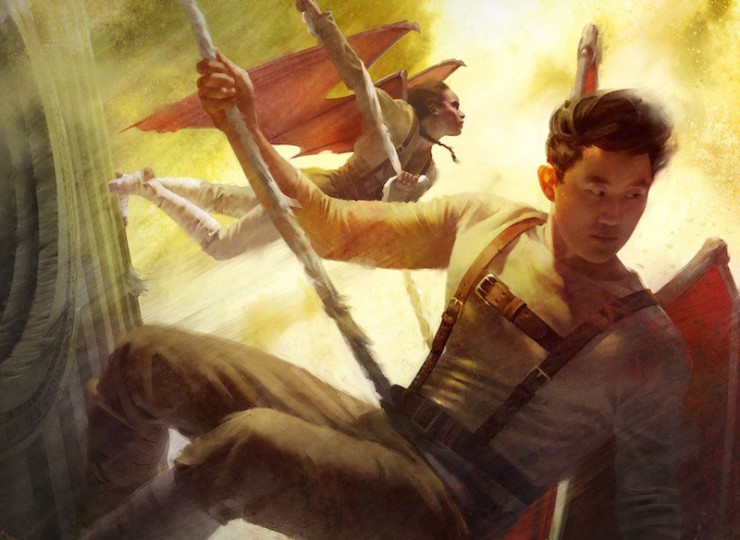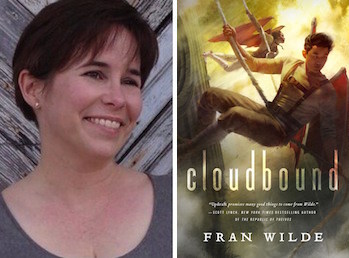To celebrate the publication of Cloudbound earlier this week, Fran Wilde popped over to Mary Robinette Kowal’s blog to talk—as many authors do on Kowal’s blog—about “her favorite bit.” But whereas the sequel to Updraft shares its predecessor’s stunning worldbuilding, which naturally leads to conversation about the man-made wings and creative echolocation its flying characters employ, Wilde wanted to discuss an aspect of the story she doesn’t get a lot of questions about: the neurological and physical disabilities that describe, but do not define, several of the characters in the Bone Universe.
These disabilities, as well as fall- and battle-related injuries, are tied up in the worldbuilding: paired with the exhilaration of flying are the consequences of the fall; and even those who stay aloft suffer, as does Elna, from cataract-related skyblindness. Moreover, Wilde stresses, there are no “magic cures” to wipe the slate clean on these characters. (This is unfortunately a pervasive trope that exists across all media, with recent conversations about its problematic nature existing in everything from children’s literature to comics to television.) Wilde writes:
But each of these characters also has their own story arc and agency within the Bone Universe. As one mostly spoiler-free example, Elna Densira has altitude and cataract-related skyblindness. She is a force in the book, as well as in Cloudbound. When we first meet her, she’s climbing a ladder to the top of her tower with Nat close behind. She still gets around well, she works to support her family, she’s capable—an excellent seamstress—and she interacts with the other characters about things other than her vision impairment. So it goes mostly unmarked. With other characters, disability is a consequence of living and fighting at high altitude, and if the injury does interfere with intra-character communication, part of the story is the importance of finding ways to listen and hear those characters, on their own terms. Disability in Updraft andCloudbound isn’t a checkbox or a layer added in order to make a character more sympathetic or anything else.
We like to put characters in boxes sometimes, and, when added as a layer to create some problem for the narrative or character, disability can become a literary box that a reader can’t see past. That occasionally happens in real life too—when only a person’s disability and not their competences, their excellences, their passions, are how they are perceived.

With relation to that box-checking, Wilde shared a very personal revelation about her own experiences with chronic pain and childhood scoliosis—experience from which she drew in writing Djonn, one of the central characters in Cloudbound. She also touched upon the problematic notion of “unlikely heroes” when conflated with disabilities:
When it came to writing Cloudbound, I’d selected a character from an earlier story set a decade earlier in the Bone Universe, called “A Moment of Gravity Circumscribed.” In that story, a young character, Djonn, is viewed as clumsy by his family—and he is, but not for the reasons they think. Djonn’s in the very early stages of a skeletal degeneration that translates to extreme late-onset idiopathic scoliosis. This curvature of the spine is something I share with my character (and something that affects, to varying levels, about 2-3% of the United States population). As a kid, my curves (there’s either one or two—I got the double) were pretty extreme, and I wore an experimental brace that caused more damage than expected. Even now, I’m not straight, though it’s hard to see. As an adult, this results in pain, overcompensation, and sometimes joint slips that cause additional pain.
For Djonn, there are no real treatments. Left untreated, spinal curves can sometimes go past 70 degrees (think King Richard III), and that’s what’s happening to him. Such curves would make flying (which requires a pretty straight body plane) progressively harder, and even breathing sometimes very difficult. Djonn’s an inventor and artifex, so he’s created his own solutions for this over time. But his backstory and his role in Cloudbound are much more about the rest of his life—the things he’s invented and his interactions with other characters—than about his physical disability. Djonn is extremely good at what he does.
Djonn’s limitations and imperfections are part of the story too. But he’s in no way an unlikely anything. Nor is he a hero through and through. He’s a complex character.
You can read the entire piece on Kowal’s site, and check out an excerpt from Cloudbound here on Tor.com.










